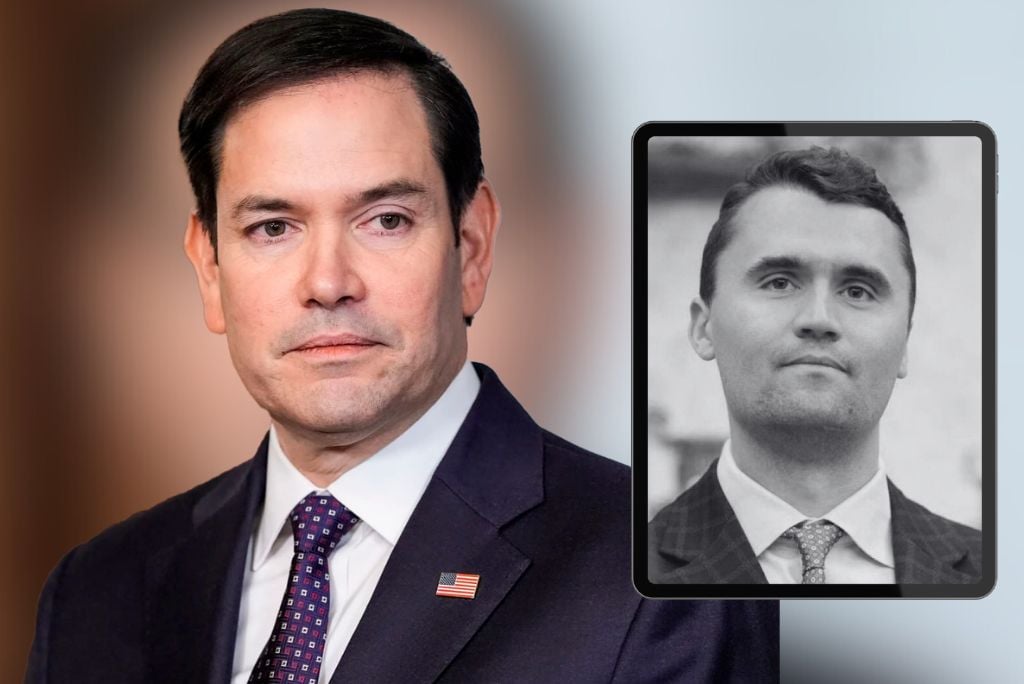On September 10, 2025, the conservative world suffered a devastating blow with the assassination of Charlie Kirk, the young and charismatic founder of Turning Point USA, during an event at Utah Valley University in Orem, Utah.
The 31-year-old activist, known for his passionate defense of conservative values and close ties to Donald Trump, was struck by a bullet to the neck from a nearby rooftop while addressing thousands of students.
This act of violence has unleashed a wave of outrage, particularly due to the mockery and celebrations that have emerged on social media, a phenomenon that U.S. Secretary of State Marco Rubio has decided to confront with a drastic measure.
Rubio announced that he will ban any foreigner who has celebrated Kirk’s assassination online from entering the country, a decision confirmed by Deputy Secretary of State Chris Landau in a statement that reverberated on September 11, 2025.
This policy reflects Rubio’s staunch stance against illegal immigration and organized crime, aligning with the Trump administration’s priorities.
The visibly shaken president ordered flags to be flown at half-staff in Kirk’s memory and announced that he will posthumously award him the Presidential Medal of Freedom, a tribute that underscores Kirk’s importance as a “giant” of his generation, according to Trump’s remarks during a 9/11 commemorative event.
Rubio’s measure comes at a time of deep polarization in the United States, exacerbated by failed assassination attempts against Trump in 2024 and a series of political violence incidents that have rocked the nation.
The FBI and Utah Department of Public Safety are leading an intense manhunt for the killer, described as a “college-age” man, after discovering a high-powered rifle and other clues in a nearby forest.
The crime scene, still sealed, stands as a somber reminder, with attendees’ belongings scattered and the echo of an event that drew over 3,000 people.Rubio’s decision also responds to public outrage over the actions of some users, including those from countries like Slovenia, who have celebrated Kirk’s death on platforms like X.
These reactions have spurred the secretary of state to act, viewing this policy as a clear message: the United States will not tolerate the glorification of violence from abroad.
This stance aligns with his recent visit to Mexico on September 3, 2025, where he highlighted unprecedented cooperation with that country to combat drug cartels, some designated as foreign terrorist organizations by Trump.
Rubio has evolved from criticizing immigration amnesty in 2010 to leading reforms in 2013, according to NPR, and now takes a bold step by linking online behavior to immigration policies.
While some critics argue this could lead to censorship, Rubio defends it as a necessary response to a climate of political violence that has included attacks on figures like Pennsylvania Governor Josh Shapiro and a shooting at the CDC in August 2025.
Democratic leaders like Chuck Schumer and Hakeem Jeffries have condemned these acts, but their silence on online reactions leaves a gap that Rubio aims to fill.The case of Kirk has united Republicans and Democrats in their rejection of violence, though divisions persist online, where memes and comments have fueled debate.
This measure could set a precedent, expanding immigration regulations beyond traditional criteria. As a conservative, Rubio’s action is a courageous stand against the radical left and its allies, who, by celebrating Kirk’s death, reveal a lack of respect for dialogue and freedom. Kirk, described by Trump as a “champion of liberty,” left a legacy that his assassination cannot erase.
Rubio’s ban not only honors his memory but also sends a global message: political violence and its promotion will face consequences.
As police continue their search for the killer, this policy could redefine the balance between national security and free expression in an increasingly divided country.
About The Author
Read the full article here
